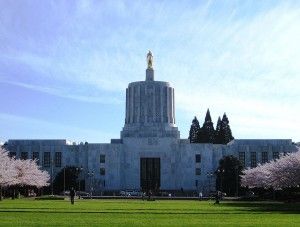
Publisher:
Bonnie King
CONTACT:
Newsroom@Salem-news.com
Advertising:
Adsales@Salem-news.com

~Truth~
~Justice~
~Peace~
TJP
Oct-06-2012 00:54

 TweetFollow @OregonNews
TweetFollow @OregonNews
OR: Taxpayer-Funded Lobbying Costs Millions
Shelby Sebens Special to Salem-News.com“Our definition in Oregon is a pretty wide net on what lobbying is,” - Ron Berson, executive director, ethics commission
 Taxpayer-funded lobbying of the Legislature in Salem cost about $3.7 million in 2009 and 2011 |
(PORTLAND, OR Northwest Watchdog) - Public agencies in Oregon used about $3.7 million in taxpayer money for government-to-government lobbying in 2009 and 2011.
How the money was spent is not entirely clear, however. Because of Oregon’s broad law on what is considered a lobbying expense, the money reported often is more than what was actually spent on face-to-face meetings with lawmakers, officials say.
The Oregon Government Ethics Commission provided the data In response to a request by Northwest Watchdog, including for the most recent long legislative sessions, in 2009 and 2011.
But most taxpayers wouldn’t know it.
“Governments absolutely should be a lot better at disclosing this information,” said Diana Lopez, senior editor of Sunshine Review, a nonprofit focused on improving state and local government transparency. “Transparency in general will get you more efficiency.”
In Oregon, public agencies — schools, cities, state departments — must report anything that might be classified as lobbying, including staff hours used to promote projects or budgets.
That $3.7 million spent in Oregon is comparable to other states. Iowa spent about $2.6 million in fiscal 2012, and it has a similar population to Oregon— about 3.1 milllion in Iowa and 3.8 million in Oregon. Minnesota spent about $8 million in 2011, with a much larger population, about 5.3 million people, according to U.S. Census estimates.
Lopez said it’s hard to compare states without doing an in-depth analysis because laws vary on what has to be reported.
“Our definition in Oregon is a pretty wide net on what lobbying is,” said Ron Berson, executive director of the ethics commission. It’s lobbying if “you’re trying to sway them one way or another.”
So not all of those dollars were spent to contract lobbying firms. For example, Berson works as a lobbyist for the ethics commission, trying to get lawmakers to support his budget. He submits the hours he worked as a lobbying expenditure for the ethics commission, but he’s not getting paid an additional amount. In 2009, he recorded $4,200; nothing in 2011. Oregon rules require agencies to report time spent lobbying if it’s more than 24 hours, or if spending reaches $100.
The city of Portland spent $334,881 on state lobbying in 2011. That money, according to city officials, went to salaries, office space, equipment and more for the portion of the city’s government relations division, which focuses on pushing the city’s agenda to the state Legislature.
Oregon law restricts lawmakers from receiving more than $50 a year in gifts from lobbyists, so the money government agencies are spending is not going directly to the respective lawmakers. But it’s not clear how many agencies might hire contract lobbyists versus how many tackle it in-house. Portland, for example, uses in-house staff for state lobbying but contracts out for congressional lobbying efforts.
Lopez says states should take a page out of Minnesota’s book, in which the state auditor releases an annual report detailing taxpayer money spent for lobbying. The report shows where taxpayer money went for lobbying, and the ratio of contract lobbyist-to-staff hours.
“They are the example,” she said.
Lopez, who has researched taxpayer-funded lobbying across the country, and other critics say the incestuous nature of government-to-government lobbying has the potential to be unfair to the taxpayers footing the bill.
“It seems to be redundant. Local governments have representatives that lobby for them as representatives. That’s the purpose of those legislators,” she said. “That system is already in place, so why would these governments go and get a lobbyist when the most effective lobbyists are already in place?”
But Mike McCauley, executive director for the League of Oregon Cities, said the agency’s 242 members need someone who has time to track the thousands of bills impacting cities each session.
The league, which acts as a voice and supplies training tools for cities, spent $274,422 on lobbying the Legislature in 2011. But again, McCauley said that includes not only the salaries of those doing the lobbying but also work done to inform members of what’s going on at the state level.
He said some towns, such as Ontario, Ore., with a population of about 11,000 near the Idaho border, would have a hard time making the trip to Salem during a session and tracking legislation that might impact the community.
Lopez emphasized the need for clearer records and availability of how the money is spent by governments on lobbying, as well as to organizations that lobby on their behalf.
“What happens sometimes is that the policies that they are promoting aren’t policies that we (taxpayers) would want to be promoted,” she said.
McCauley said the league is focusing on bills in 2013 that would impact city budgets and land-use planning.
Contact Shelby Sebens at Shelby@NorthwestWatchdog.org, or follow her on Twitter @ShelbySebens. For more Northwest Watchdog updates, visit Facebook and Twitter.
Articles for October 5, 2012 | Articles for October 6, 2012 | Articles for October 7, 2012
Quick Links
DINING
Willamette UniversityGoudy Commons Cafe
Dine on the Queen
Willamette Queen Sternwheeler
MUST SEE SALEM
Oregon Capitol ToursCapitol History Gateway
Willamette River Ride
Willamette Queen Sternwheeler
Historic Home Tours:
Deepwood Museum
The Bush House
Gaiety Hollow Garden
AUCTIONS - APPRAISALS
Auction Masters & AppraisalsCONSTRUCTION SERVICES
Roofing and ContractingSheridan, Ore.
ONLINE SHOPPING
Special Occasion DressesAdvertise with Salem-News
Contact:AdSales@Salem-News.com

googlec507860f6901db00.html



Terms of Service | Privacy Policy
All comments and messages are approved by people and self promotional links or unacceptable comments are denied.
[Return to Top]
©2025 Salem-News.com. All opinions expressed in this article are those of the author and do not necessarily reflect those of Salem-News.com.